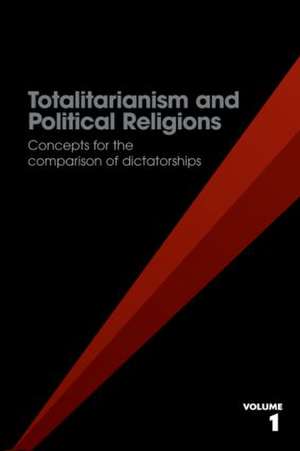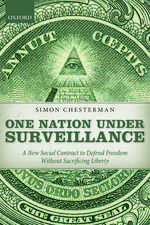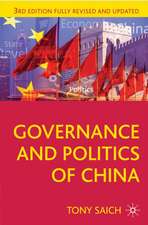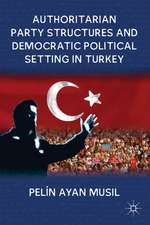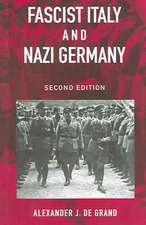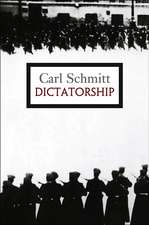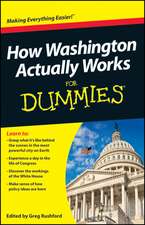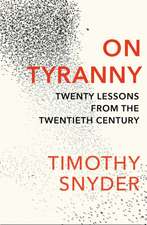Totalitarianism and Political Religions, Volume 1: Concepts for the Comparison of Dictatorships: Totalitarianism Movements and Political Religions
Editat de Hans Maieren Limba Engleză Paperback – 14 oct 2004
This book documents the first international conference on this theme, a conference that took place in September of 1994 at the University of Munich. The book shows how new models for understanding political history arose from the experience of modern despotic regimes. Here, the most important concepts - totalitarianism and political religions - are discussed and tested in terms of their usefulness.
| Toate formatele și edițiile | Preț | Express |
|---|---|---|
| Paperback (1) | 545.79 lei 6-8 săpt. | |
| Taylor & Francis – 14 oct 2004 | 545.79 lei 6-8 săpt. | |
| Hardback (1) | 1452.86 lei 6-8 săpt. | |
| Taylor & Francis – 12 aug 2004 | 1452.86 lei 6-8 săpt. |
Preț: 545.79 lei
Preț vechi: 642.11 lei
-15% Nou
Puncte Express: 819
Preț estimativ în valută:
104.47€ • 109.76$ • 87.80£
104.47€ • 109.76$ • 87.80£
Carte tipărită la comandă
Livrare economică 12-26 martie
Preluare comenzi: 021 569.72.76
Specificații
ISBN-13: 9780714685298
ISBN-10: 0714685291
Pagini: 428
Ilustrații: black & white illustrations
Dimensiuni: 156 x 234 x 24 mm
Greutate: 0.61 kg
Ediția:1
Editura: Taylor & Francis
Colecția Routledge
Seria Totalitarianism Movements and Political Religions
Locul publicării:Oxford, United Kingdom
ISBN-10: 0714685291
Pagini: 428
Ilustrații: black & white illustrations
Dimensiuni: 156 x 234 x 24 mm
Greutate: 0.61 kg
Ediția:1
Editura: Taylor & Francis
Colecția Routledge
Seria Totalitarianism Movements and Political Religions
Locul publicării:Oxford, United Kingdom
Public țintă
General, Postgraduate, and UndergraduateCuprins
Part 1: Totalitarianism 1. The History of the Concept of Totalitarianism in Italy 2. Luigi Sturzo as a Theorist of Totalitarianism 3. Waldemar Gurian and the Development of the Concept of Totalitarianism 4. Reflections on Russian Totalitarianism 5. Natural Science in the Soviet Union under Totalitarian Conditions at the Beginning of the 1930s 6. The Other Side of Totalitarianism: The state of the debate in Hungary 7. A Glance at the History and Present of the Bohemian Countries Part 2: Political Religions 8. The Religious Use of Politics and/or the Political Use of Religion: Ersatz ideology versus ersatz religion 9 . Terror and Salvation: Experience of Political Events in the Work of Romano Guardini 10. The Concept of 'Political Religions' in the Thought of Eric Voegelin 11. The Modern Despotic Regime and Literature Part 3: General Discussion 12. Concepts for the Comparison of Dictatorships: 'Totalitarianism' and 'political religions' 13. Totalitarianism in Eastern Europe and its Consequences: A theoretical perspective 14. Despotism, Ersatz Religion, Religious Ersatz 15. Reflections on Future Totalitarianism Research 16. The Historicity of Totalitarianism: George Orwell's evidence Part 4: Research Contributions 17. Totalitarianism as a Twentieth-Century Phenomenon 18. National Socialism, Fascism and Authoritarian Regimes 19. Religious and Ecclesiastical Structures in Communism and National Socialism, and the Role of the Writer 20. Enlightenment and Terror: Historico-metaphysical prerequisites of totalitarian democracy 21. On Marxism, Christianity and Totalitarianism
Notă biografică
Hans Maier, born on June 18, 1931 in Freiburg in Breisgau, is Emeritus Professor for Political Science and the Theory of Religion at the University of Munich. He was the Bavarian Minister of Culture and Science from 1970 to 1986 and President of the Central Committee of German Catholics from 1976 to 1986. Major publications include Revolution und Kirche (1959), in English, Revolution and Church: The Early History of Christian Democracy, 1789-1901 (London: University of Notre Dame Press, 1969). Also Die ältere deutsch Staats- und Verwaltungslehre (1966), Die christliche Zeitrechnung (1991), Politische Religionen (1995) and Welt ohne Christentum - was wäre anders? (1999).
Descriere
This book shows how new models by which to understand political history arose from the experience of modern despotic regimes. Here, the totalitarianism and political religions - are discussed and tested in terms of their usefulness.
